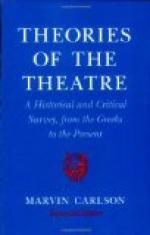It follows that those who think about the drama in relation to society at large, and consider as a matter of serious importance the effect of the theatre on the ticket-buying public, should devote profound consideration to that subtle quality of plays which I may call their tone. Since the drama convinces less by its arguments than by its presence, less by its intellectual substance than by its emotional suggestion, we have a right to demand that it shall be not only moral but also sweet and healthful and inspiriting.
After witnessing the admirable performance of Mrs. Fiske and the members of her skilfully selected company in Henrik Ibsen’s dreary and depressing Rosmersholm, I went home and sought solace from a reperusal of an old play, by the buoyant and healthy Thomas Heywood, which is sweetly named The Fair Maid of the West. Rosmersholm is of all the social plays of Ibsen the least interesting to witness on the stage, because the spectator is left entirely in the dark concerning the character and the motives of Rebecca West until her confession at the close of the third act, and can therefore understand the play only on a second seeing. But except for this important structural defect the drama is a masterpiece of art; and it is surely unnecessary to dwell upon its many merits. On the other hand, The Fair Maid of the West is very far from being masterly in art. In structure it is loose and careless; in characterisation it is inconsistent and frequently untrue; in style it is uneven and without distinction. Ibsen, in sheer mastery of dramaturgic means, stands fourth in rank among the world’s great dramatists. Heywood was merely an actor with a gift for telling stories, who flung together upward of two hundred and twenty plays during the course of his casual career. And yet The Fair Maid of the West seemed to me that evening, and seems to me evermore in retrospect, a nobler work than Rosmersholm; for the Norwegian drama gives a doleful exhibition of unnecessary misery, while the Elizabethan play is fresh and wholesome, and fragrant with the breath of joy.
Of two plays equally true in content and in treatment, equally accomplished in structure, in characterisation, and in style, that one is finally the better which evokes from the audience the healthiest and hopefullest emotional response. This is the reason why Oedipus King is a better play than Ghosts. The two pieces are not dissimilar in subject and are strikingly alike in art. Each is a terrible presentment of a revolting theme; each, like an avalanche, crashes to foredoomed catastrophe. But the Greek tragedy is nobler in tone, because it leaves us a lofty reverence for the gods, whereas its modern counterpart disgusts us with the inexorable laws of life,—which are only the old gods divested of imagined personality.




